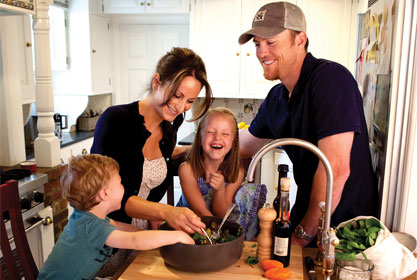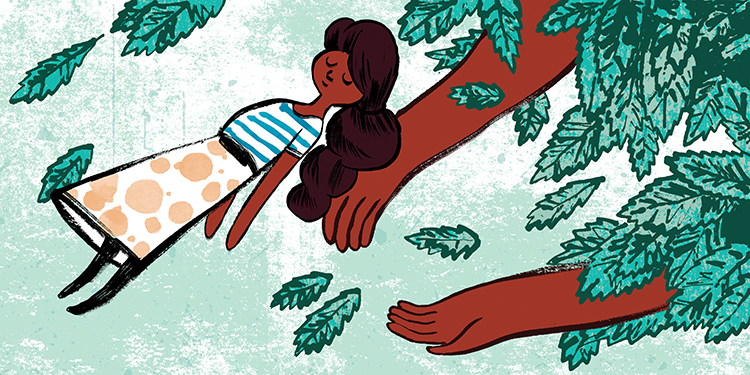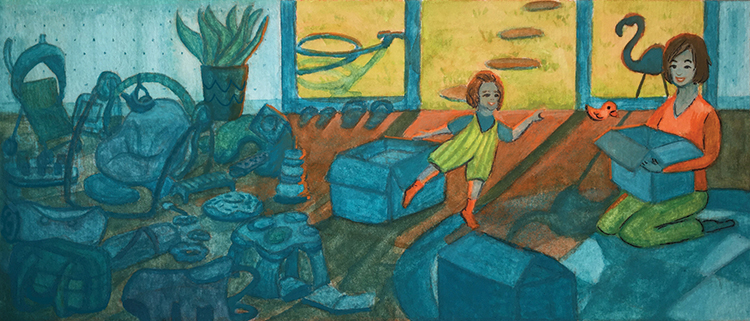 Story by Lindsay Lidge | Photo by Lora Carr
Story by Lindsay Lidge | Photo by Lora Carr
My story begins like those of many others who are passionate about real food. I was surrounded by it from the beginning. I spent my young childhood growing up on our family farm in Missouri with cows, sheep, pigs and an enormous garden that nourished us with everything from Brussels sprouts to cherries.
Cooking and family meals were important to us, too. Everyone helped out. I remember that, when I was a little girl, my brother and I loved to help shell the peas from the garden, shuck the corn or carry bowls to the table. For special dinners I was even allowed to light the candles myself. We had real plates and cloth napkins, and if dinner was at my grandma’s house, there were always flowers on the table.
By age 5, I knew that not all food is created equal. It was normal to hear the adults, especially my grandma, talk about eating only “happy cows or happy chickens,” and paying more for whole, real food now instead of doctor bills later.
Not that my youth was all broccoli and turnips. When I was a little older, we moved away from our farm, and our lives became busy with sports, school and work. As a teenager, I enjoyed Cherry Coke as much as the next kid. One summer before college, I was a counselor at a kid’s summer camp, and saw the junk that these poor kids were being fed. It really upset me. I went to college and enrolled in the dietetics program, full of hope that I could help change the world with healthy eating.
But “nutrition” is part of the problem. During my studies, we counted calories, fat grams and carbohydrates—as if any of these qualified food as healthy or not. I also found the material—not to mention government regulations—to be transparently influenced by large agricultural businesses. When I saw how this affected real people during an internship at a hospital, I dropped out of the course, frustrated and confused. I read every book and watched every documentary I could find about food politics and our broken food system. The more I learned, the more I wanted to change it.
After having our daughter and son, my husband, Brad, and I could see that with every bite we fed them, we were shaping their tastes, bodies and experiences. With every dollar we spend we support something, whether it’s Monsanto’s genetically modified soybeans or the small family farm down the road. When our family moved to Philadelphia, we learned about the amazing work the Food Trust is doing. After one phone call, Brad and I knew it was the perfect place to share our passion.
As a mom, I try to instill in our children an appreciation for food with peels and skins, grown with hands and hard work, rather than “food” from boxes that’s produced in factories by scientists. We show them this by growing a garden with them. We let them take ownership in everything from shopping for seeds, planting and watering, to everyone’s favorite part: harvesting and eating. The kids are helping cook in the kitchen, too. Another huge part is something that we don’t do: have the TV on very much. Kids’ channels are loaded with marketing for processed food specifically for kids, and none of it is beneficial for their growing ideas. We also talk with them about our current food system (in an age-appropriate way) and its effects on all of us: people, animals, our environment and our future. And most importantly, we teach them that their actions and choices matter, and that they absolutely make a difference.
I want our children to have the same warm feelings of food and mealtime that we and many generations before us had. I hope all of our children will know the surprise in pulling a carrot from the earth, and appreciate the warm taste of tomatoes just off the vine. I hope all our children will be nourished at the table, both in their bodies and souls. I hope our children learn that we cannot separate our health from the health of our soil. I know we can heal our world, and all living things; we need to start from the ground up.
Lindsay Lidge shares snacking tips and Lidge family recipes at the Team Up! blog she writes for the Food Trust. She is married to Phillies pitcher Brad Lidge. Read her at thefoodtrust.org/teamup.











Great artical, Linds! Your passion is inspiring…you're so right, kids think "snacks" come in a box or bag, not grown from the ground.
Great artical, Linds! Your passion is inspiring…you're so right, kids think "snacks" come in a box or bag, not grown from the ground.
I have learned so many sad things about the government regulations that determine the food most American kids eat in their schools.
I was never very aware of the difference between fresh and processed food growing up. My parents were both very busy and I fixed a lot of my own meals as a child. But as an adult I've shifted away from boxed and frozen and canned foods in favor of making my own from fresh ingredients. So much better!